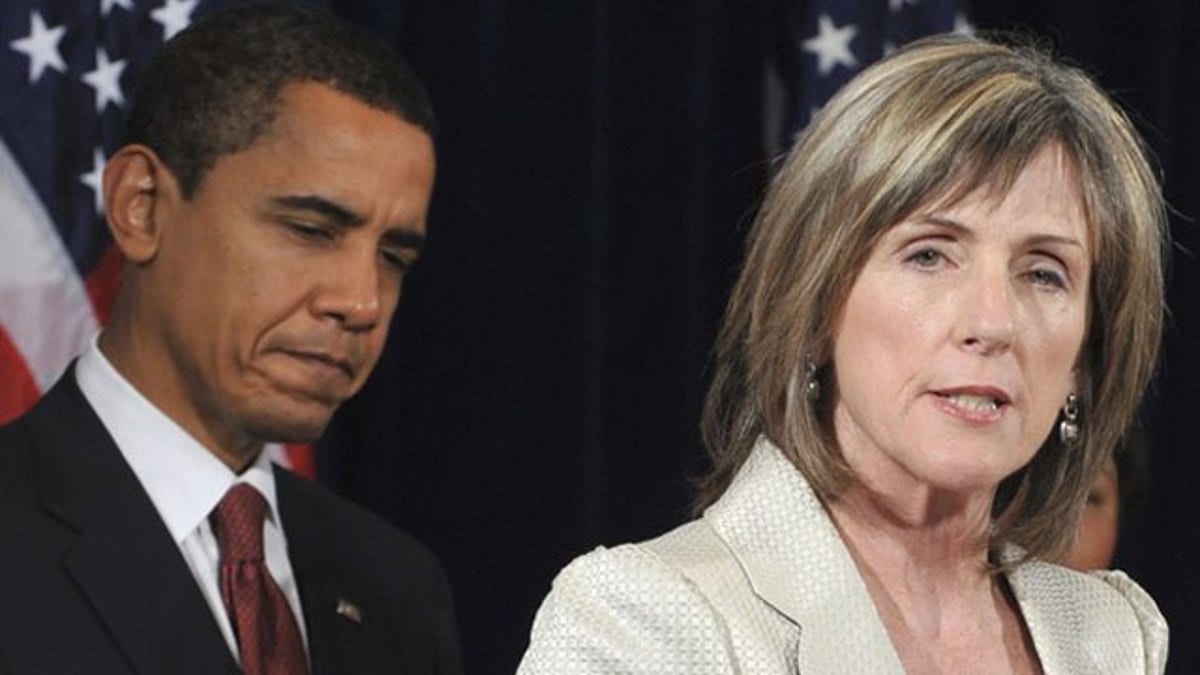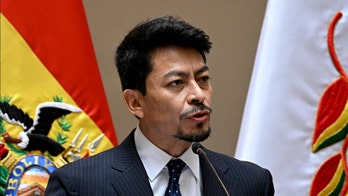
In this Dec. 15, 2008, file photo, then-President-elect Barack Obama listens to former Environmental Protection Agency chief Carol Browner speak after he named her as his energy and climate adviser. (Reuters)
If House Republicans have their way, the Obama administration's "czars" will no longer be able to dictate pay at bailed-out mega-firms or negotiate new emissions standards for U.S. vehicles. An amendment attached to the 2011 spending package, which passed the House last week, would strip funding for a select list of the so-called czars.
Rep. Steve Scalise, R-La., the author of the proposal, hailed the vote as a step toward ending the administration's "shadow government."
"Hardworking American families should not be forced to pay millions of dollars to fund these czars, who are implementing radical policies under the cloak of darkness," Scalise said in a written statement.
Though the Obama administration is not the first to appoint high-level officials without Senate approval, they've become a popular target for Republicans since President Obama took office.
The Scalise amendment was a refined version of a catch-all anti-czar bill he introduced earlier in the session. That bill called for effectively shutting down any Executive Office task force or office led by an official who had not received Senate confirmation. At the time, Scalise estimated that 39 officials would fall under that description.
The latest amendment, which would still have to survive a vote in the Democratic-controlled Senate, narrowed that list down to nine positions. Several of them have been responsible for shepherding high-profile policy changes that Republicans opposed practically in lockstep.
Here's the kind of "czar" activities that Republicans would stop if their amendment becomes law:
-- No more administration agreements on greenhouse-gas emissions. On the list for funding elimination is the assistant to the president for energy and climate change, known colloquially as the "climate czar." That official, Carol Browner, is expected to leave the position, following a tenure during which she helped strike a deal to increase fuel economy standards and require greenhouse-gas emissions standards for automakers.
"Let her leave, and take the funding, too," Scalise said on the House floor last week.
Even if that position is eliminated, however, the EPA is still pushing forward on limiting emissions for power plants and oil refineries.
-- No more edicts on executive pay. The Scalise proposal targets the special master for TARP executive compensation -- also known as the pay czar, who until recently was Kenneth Feinberg.
In that position, Feinberg sought deep pay cuts among top executives at seven firms that got "exceptional assistance" from the government's financial industry and auto industry bailouts. A Congressional Oversight Panel report this month showed the average pay decrease for the 25 highest-paid workers from 2008 to 2009 was nearly 55 percent.
Though some lawmakers have expressed concern that the pay czar's work could lead the government down a slippery slope when it comes to regulating private-sector salaries, the oversight panel report also noted that the "special master" position was created in response to a congressional mandate imposing pay restrictions on bailout recipients.
The pay czar is also not the only entity with that responsibility. The Treasury Department established an Office of Internal Review to, similarly, review pay packages for executives at bailout-funded firms.
-- No more "secret" meetings on the health care law. In addition to the "special master" post, the Scalise amendment would target the White House Office of Health Reform. The longtime director of that office, Nancy-Ann DeParle, was just promoted to White House deputy chief of staff.
DeParle's responsibilities were numerous. She was primarily tasked with coordinating the development of the law's policies across the Executive Branch. But on the House floor, Scalise suggested the "ObamaCare czar" helped facilitate too many backroom deals in the process.
Scalise noted that hundreds of companies have gotten exemptions from the law. In addition, Republicans on the House Energy and Commerce Committee just wrote to DeParle requesting information about "secret negotiations" with interest groups conducted by the Office of Health Reform regarding the details of the health care overhaul.
In response to criticism about the waivers, the White House said last year that the exemptions -- issued by the Department of Health and Human Services -- only apply, on a temporary basis, to a provision to phase out annual limits.
-- No more visits to foreign countries to convince them to take Guantanamo Bay detainees. That's been the job of Daniel Fried, special envoy to oversee the closure of the Guantanamo Bay detention center. He's tasked with facilitating the closure of Guantanamo and finding homes for those prisoners deemed fit for release.
But many lawmakers don't want Guantanamo closed in the first place, and Defense Secretary Robert Gates recently acknowledged chances are slim that the shutdown would happen. That being the case, Republicans would like to see Fried's position simply eliminated.
-- No more trips to United Nations climate summits to negotiate western commitments to developing nations. The other "climate" czar, special envoy for climate change Todd Stern, has been an administration point man for these summits, most recently in Cancun, Mexico. The Scalise amendment would eliminate funding for that job.
-- No more plans to close auto dealerships en masse. The Obama administration's Task Force on the Auto Industry pressed General Motors and Chrysler to cut costs as part of bailout and restructuring negotiations, resulting in plans from the companies to close hundreds of dealerships. An inspector general report released last summer faulted the Treasury Department for not fully considering the economic side effects from that plan. Scalise's amendment targets the senior Treasury adviser to that task force, Ron Bloom, who is now senior counselor for manufacturing policy. Bloom was also credited with extracting significant concessions from all parties during the auto negotiations.
The other positions targeted by the Scalise House amendment are:
-- Special adviser for green jobs, enterprise and innovation
-- White House director of urban affairs
-- Chief diversity officer for the Federal Communications Commission
























